1775
First step is the Committees placement. Barring any evidence that my choices last time contributed to the debacle, I use the same placement.
- Falmouth (MA)
- New Haven (CT)
- Norwich (NH)
- Newport (RI)
- New York (NY)
- Baltimore (MD)
- New Brunswick (NJ)
- Wilmington (DE)
- Basset Town (PA)
- Alexandria (VA)
- Wake (NC)
- Cheraw (SC)
- Savannah (GA)
Then the Americans unveil their Declaration of Independence. (I didn't play this as my first card because I needed two PC placements in New York to block him off in that state). The declaration enables PC placements in:
- Springfield, MA
- Battleboro, NH
- Long Island, NY
- Morristown, NJ
- Lynch's Ferry, VA
- Salem, NC
- Camden, SC
- St Mary's, GA
- Reading, PA
- Fredericktown, MD
- Hartford, CT
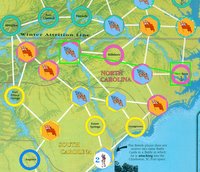 And so they do what they can, placing PCs in Saratoga, Hillsboro and Abingdon, which are immediately countered by American placements in Albany and Fort Chiswell.
And so they do what they can, placing PCs in Saratoga, Hillsboro and Abingdon, which are immediately countered by American placements in Albany and Fort Chiswell.With expansion possibilities blocked at every turn, Cornwallis arrives with 3CU in Norfolk and moves on to Baltimore, threatening the Continental Congress.What they can't win by swaying men's opinions, they will take with force of arms. Figuring they can't do too much damage by dispersing the congress, since the Americans don't have many PC placement plans remaining, Arnold raises a small force (1CU) in Wake.
As 1775 draws to a close, Washington moves his army (5CU) into Winter Quarters, The British follow suit while stil expanding their influence by force, using a Campaign to move Howe and his army (5CU) to Albany and Cornwallis with his 3CU to Wilmington, flipping both PCs.
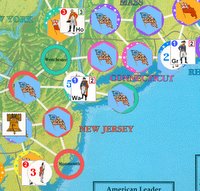 Clearly a flying start for the Americans with the lucky draw of Declaration of Independence on the first turn!
Clearly a flying start for the Americans with the lucky draw of Declaration of Independence on the first turn!Colony Status (B=3, A=10, N=1)
Canada (B)
New Hampshire (A)
Massachussets (A)
Connecticut (A)
Rhode Island (A)
New York (A)
New Jersey (A)
Pennsylvania (A)
Delaware (B)
Maryland (N)
Virginia (A)
North Carolina (B)
South Carolina (A)
Georgia (A)
At present, the war is going to end in 1783.
1776
Seeking to block Howe away from the coast and feeling as though the board position enables him to leave the Continental Congress to its fate, Washington engages him in Albany, breaking the British lines on the left after a see-saw struggle and sending Howe to Fort Stanwix with only 3CU left. Sure enough, the British respond by marching Cornwallis into Philadelphia, dispersing Congress .
The French provide clandestine aid to the Americans, allowing them to draw two cards, and then a flurry of news stories on both sides swings the public's mood about the war's duration wildly (3 "war ends" cards in a row!).
The pause enables the british to assemble and sail reinforcements from Britain. Nurgoyne and 5CU land in Baltimore, ready to take the fight to the Americans who respond by reinforcing Arnold with 3CU. Burgoyne, however, marches in the other direction, ending up in Pittsburgh where they can convert a space from Winter Quarters.
George Rogers Clark Launches A Western Offensive, but the British response is minor (discarding a 1Ops card) and they end the turn by moving Carleton and 2 CUs from Quebec to Norwich to deny the colonists control of New Hampshire.
 The Americans have several moves to end the turn, since they got and extra card and forced a discard. Arnold moves his Army (4CU) to Norfolk, denying the British a port in the South and isolating their PCs in Hillsboro and Petersburg. Then Washington marches to Philadelphia to attack Cornwallis and prevent him from converting Philadelphia. The Americans surprise the British by coordinating a Double Envelopment, and the British are routed from the field quickly, losing 2CU in the process and retreating to Wilmington.
The Americans have several moves to end the turn, since they got and extra card and forced a discard. Arnold moves his Army (4CU) to Norfolk, denying the British a port in the South and isolating their PCs in Hillsboro and Petersburg. Then Washington marches to Philadelphia to attack Cornwallis and prevent him from converting Philadelphia. The Americans surprise the British by coordinating a Double Envelopment, and the British are routed from the field quickly, losing 2CU in the process and retreating to Wilmington.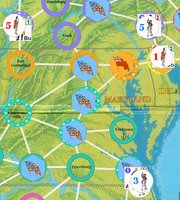 British PCs in Hillsboro and Petersburg are removed due to isolation. Fort Stanwix, Pittsburgh, and Norwich convert to British control. Norfolk converts to American control. The Continental Congress is re-convened in Philadelphia.
British PCs in Hillsboro and Petersburg are removed due to isolation. Fort Stanwix, Pittsburgh, and Norwich convert to British control. Norfolk converts to American control. The Continental Congress is re-convened in Philadelphia.A fairly uneventful turn, really. Dennis has driven two states from American control to Neutral status and his forces are well-positioned to do more damge, although they are mostly in the interior and away from the Ports where they are so formidable.
Colony Status (B=2, A=8, N=4)
Canada (B)
New Hampshire (N)
Massachussets (A)
Connecticut (A)
Rhode Island (A)
New York (N)
New Jersey (A)
Pennsylvania (A)
Delaware (B)
Maryland (N)
Virginia (A)
North Carolina (N)
South Carolina (A)
Georgia (A)
At present, the war is going to end in 1781.
1777
Lacking any experience or history to call on, and since the space is safe for now, the Continental Congress reconvenes in Philadelphia. Even as I am doing it, I think it might be a mistake, but I will live and learn.
The Americans start the turn with a PC in Genessee which is enough for now to bring New York back into the fold. The British bring more reinforcements to the colonies, landing 3CUs in Wilmington to join Cornwallis and his 2CU already there. In response, Gates pulls together 3CU worth of colonists in Monmouth to control the space, hem Cornwallis in, and prevent any possibility of surrounding Washington in Philadelphia.
The Colonists near Burgoyne's army are feeling the pinch, and the loyalty of Harrisburg and Fort Cumberland is now firmly British. Maryland switches sides and Philadelphia is teetering. But word comes that Don Bernardo Galvez Leads A Spanish Offensive, and Burgoyne must send 2CU to deal with the problem, whittling his army down to 3CU. Howe moves his force from Fort Stanwix to New York.
Sensing that Dennis has a campaign and is gearing up to trap Washington, the Americans launch a pre-emptive campaign aimed at Burgoyne. Arnold positions his army in Fort Cumberland, cutting off his escape to the south and positioning himself to convert Maryland back to the American side. We need to attack through British-controlled Wilmington, so Burgoyne has no escape route, so Washington cannot lead this battle (if he lost he would be eliminated). Instead Burgoyne strengthens his army to 5CU from Philadelphia and attacks Burgoyne himself, successfully. Burgoyne's force is mopped up in retreat and Burgoyne himself is captured.
 Washington then retreats with his force to a more defensible position, with more retreat options, in Fredericktown. The Congress is likely to be dispersed once again, proving how prescient I was in predicting how bad a placement this was on my part. Plus I have only one Ops card left, so I will suffer some attrition. But at the expense of a British Army and a central location in Pennsylvania, I think the trade will prove worth it in the end.
Washington then retreats with his force to a more defensible position, with more retreat options, in Fredericktown. The Congress is likely to be dispersed once again, proving how prescient I was in predicting how bad a placement this was on my part. Plus I have only one Ops card left, so I will suffer some attrition. But at the expense of a British Army and a central location in Pennsylvania, I think the trade will prove worth it in the end.Howe converts New York and adds a PC in Westchester. The British now have a hold on New York and I don't think I am likely to get it back anytime soon, since I have no presence in upstate New York from which to fight back. To make matters worse, while the Americans discard cards, Josiah Martin Rallies North Carolina Tories, removing a PC from Wake, and opening North Carolina to PC placement once again. And the Banastre Tarleton Waxhaws Massacre occurs, removing a CU from Washington, who now finds himself with just 2CU.
Washington is now in real danger of losing his force in battle either now or from a battle after attrition, and much as I want to place a PC in Wake, I place 2CU with Washington, to keep him safe. The British follow that with PC placement in Wake and Concord to end the turn.
 Washington and Arnold each lose 2 CUs (now 2 each) during the Winter. The Americans place PCs in Pittsburgh and Fort Cumberland and the British remove an isolated PC in Harrisburg.
Washington and Arnold each lose 2 CUs (now 2 each) during the Winter. The Americans place PCs in Pittsburgh and Fort Cumberland and the British remove an isolated PC in Harrisburg.I may have stuck my neck out too far and left Washington too exposed. He has only 2CU with him and if the british get a Campaign, he may be able to eliminate him. So I will have to sweat bullets while I wait to see what the British do to start 1778. And even if I dodge that bullet, the British are clawing their way back into control in several areas.
Colony Status (B=4, A=8, N=1)
Canada (B)
New Hampshire (B)
Massachussets (A)
Connecticut (A)
Rhode Island (A)
New York (N)
New Jersey (A)
Pennsylvania (A)
Delaware (B)
Maryland (A)
Virginia (A)
North Carolina (B)
South Carolina (A)
Georgia (A)
At present, the war is going to end in 1781.
1778
I luck out to start the turn, and am able to play first and reinforce Washington in Fredericktown with 3CU, bringing his army up to 5CU. Of course that enables the british to walk unopposed into Philadelphia, scattering the Continental Congress for the second time and making PC placement difficult for me. North Carolina is definately in danger of becoming even more solidly British as a result, and I need to watch out in Pennsylvania as well.
First, I want to stop worrying about Washington, so I move him and his Army to Abingdon. Thr British announce their intention to begin re-conquering the Northeast, landing Burgoyne and 5CU in Boston. Only Greene and 2Cu are available to stymie Burgoyne and Carleton, meaning that the British will enjoy a fairly free hand so long as their generals are mobile.
Francis Marion Guerrilla Activity causes the people of Charleston to switch allegiance to the Americans.
Howe rouses himself from his Winter Quarters and attacks gates in Pittsburgh. Arnold intercepts into Pittsburgh, for his troubles, however, he is relieved of his command (2 generals in a single space), which turns out to be a fairly good thing since he proves to be a traitor. Despite a numerically superior army and the support of local militia, the American's are utterly undone by Howe's first maneuver, falling prey to a Double Envelopment which Arnold has assured Howe will prove successful. On thebright side, only 2 CU are lost as the Americans flee to Basset Town.
With Arnold's treason still sending shockwaves, Lafayette is promoted and raises an army (3CU) in Reading, threatening to surround Howe. The British ignore the threat, and instead consolidate their gains, flipping PCs in Philadelphia and Pittsburgh.
 News of Howe's victory and Arnold's treason steels the resolve of Parliament, and the war will now end in 1782.
News of Howe's victory and Arnold's treason steels the resolve of Parliament, and the war will now end in 1782.The British begin to retake the Northeast next, moving Carleton to Springfield, which will move Massachussets into the neutral column when the PC is flipped.
Deciding that the threat to Howe is proving ineffective (the British know that the Americans can't mount a credible attack against him), gates takes his Army south to Charlottesville to avoid attrition and protect Virginia. Cornwallis, meanwhile, continues to expand the British presence in Pennsylvania with a move to Wyoming Valley while Lafeyette moves his army into Winter Quarters in the now-abandoned Philadelphia to counter the move.
Washington loses 2CU to Winter Attrition in Abingdon and Congress re-convenes in Charlotesville. Lots of Political activity to close out the year. PCs are flipped in Springfield (British), Philadelphia (American), Abingdon (American), Charlottesville (American), and Wyoming Valley (British). Finally, isolated American PCs in Fort Niagra, Oswego, Genesee, Brattleboro, Falmouth and Long Island are removed.
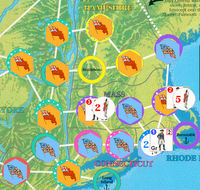 A very bad situation for the Americans, to say the least. Dennis has skillfully undone all the advantages my early card luck bought for me.
A very bad situation for the Americans, to say the least. Dennis has skillfully undone all the advantages my early card luck bought for me.Colony Status (B=5, A=8, N=1)
Canada (B)
New Hampshire (B)
Massachussets (N)
Connecticut (A)
Rhode Island (A)
New York (B)
New Jersey (A)
Pennsylvania (A)
Delaware (B)
Maryland (A)
Virginia (A)
North Carolina (B)
South Carolina (A)
Georgia (A)
At present, the war is going to end in 1782.
1779
The British have climbed all the way back and really unhinged the American's strong opening position. The one advantage I still retain is that he has no Armies in the South, and I need to sew that up as best I can.
Americans start 1779 by placing PCs in Yorktown, New Bern, and Wilmington, leaving Georgetown as the only port in the South where British reinforcements can arrive. Meanwhile, William Pitt Peace Talks take place, convincing colonists in Fredericktown and New Brunswick that the war can end amicably, and returning both spaces to neutral.
The Americans continue to focus on the South, placing more PCs in Fort Price George, Augusta, and Hilsboro. The only PC the British have in the south which is not threatened with isolation at turns end, is the one in Georgetown. The British subjects are not convinced by peace talks that the war is worth it, and their patience is wearing thin, meaning that the war will end in 1779, this turn. Howe's please for "just a little more time" fall on deaf ears.
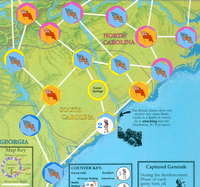 At this point, all of the War ends cards have been played, so it's a race to get the necessary number of colonies. The Americans place a PC in Fredericktown, securing Maryland's allegiance. The British place a PC in New Brunswick, but that's followed by an American PC in Monmouth, securing New Jersey's loyalty for the Americans.
At this point, all of the War ends cards have been played, so it's a race to get the necessary number of colonies. The Americans place a PC in Fredericktown, securing Maryland's allegiance. The British place a PC in New Brunswick, but that's followed by an American PC in Monmouth, securing New Jersey's loyalty for the Americans. The British place a PC in Harrisburg, but that's followed by an American PC in York, And with the 6th 1Ops card played in a row by the two of us, the British place a PC in Falmouth, securing Masachussetts's loyalty for the British.
The British place a PC in Harrisburg, but that's followed by an American PC in York, And with the 6th 1Ops card played in a row by the two of us, the British place a PC in Falmouth, securing Masachussetts's loyalty for the British.There are rumbling of a European War that come to nothing, and the British decide to concede at this point. The Americans have 9 colonies with one more card play, which will be used to defeat the 1 British CU in Wilmington, securing a 10th colony, and the British can't re-take 2 colonies with their current hand.
Conclusion
There were two deciding factors in this game. The first was the obscene starting hand for the Americans, which enabled me to bottle up British PC placement for a long time. The second was the British hand in 1779. The combination of a War Ends in 1779 card and nothing but 1Ops cards, with which he could not move his generals or develop sufficient counter-PC placement.
Those two things doomed Dennis. But given that starting hand, I would definately categorize this as a moral victory for him, since he battled back to fairly even terms by the end of 1778, and I think would have won a longer game.
With our series of 5 We the People games at 3-2 (for Dennis), we decide to branch out and try Hannibal: Rome vs. Carthage next.



No comments:
Post a Comment